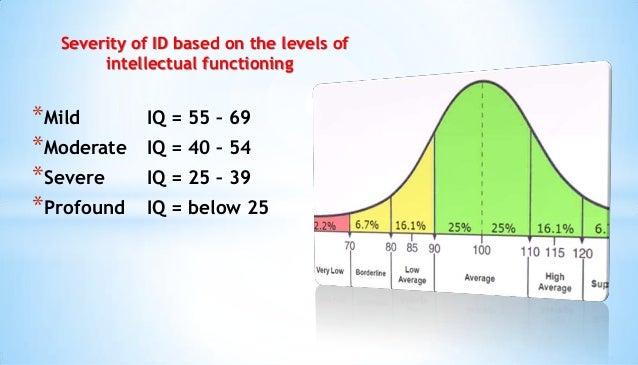
Intellectual Disabilities are defined by the American Association of Intellectual and Developmental Disabilities as a disabilitiy characterized by significant limitations in both intellectual functioning and adaptive behaviors. This disability originates before the age of 18.
(http://aaidd.org/intellectual-disability/definition#.VjjaG7erTIU)



<iframe width="420" height="315" src="https://www.youtube.com/embed/V_mTP9WLdcI" frameborder="0" allowfullscreen></iframe>
(http://aaidd.org/intellectual-disability/definition#.VjjaG7erTIU)

Indicators
- Delayed development such as sitting, crawling, standing, walking, or talking
- Failure to appreciate and avoid dangerous situations such as playing in the street, or touching a hot stove
- Excessive behavioral problems such as impulsivity and poor frustration tolerance
- Difficulty learning new information despite significant effort and repetition
- Difficulty learning new skills despite significant practice
- Lack of or slow development of motor skills, language skills, and self-help skills, especially when compared to peers
- Failure to grow intellectually or continued infant-like behavior
- Lack of curiosity
- Problems keeping up in school
- Failure to adapt (adjust to new situations)
- Difficulty understanding and following social rules

Accommodations

Presentation Accommodations
- Listen to audio recordings instead of reading text
- Use visual presentations of verbal material, such as word webs and visual organizers
- Work with fewer items per page or line and/or materials in a larger print size
- Sit where he learns best (for example, near the teacher)
- Use sensory tools such as an exercise band that can be looped around a chair’s legs (so fidgety kids can kick it and quietly get their energy out)
- Work or take a test in a different setting, such as a quiet room with few distractions
- Take more time to complete a task or a test
- Have extra time to process oral information and directions
- Take more time to complete a project
- Take a test in several timed sessions or over several days
- Take sections of a test in a different order
- Use an alarm to help with time management
- Mark texts with a highlighter
- Have help coordinating assignments in a book or planner
- Receive study skills instruction
Modifications
Assignment Modifications
- Complete fewer or different homework problems than peers
- Write shorter papers
- Answer fewer or different test questions
- Create alternate projects or assignments
- Learn different material (such as continuing to work on multiplication while classmates move on to fractions)
- Get graded or assessed using a different standard than the one for classmates
- Be excused from particular projects
https://www.understood.org/en/learning-attention-issues/treatments-approaches/educational-strategies/common-modifications-and-accommodations
- Give more concrete assignments on a related topic
- Give easier questions on same concept
- Change learning tasks with similar topic by simplifying or condensing, combining or grouping, or by using special coding.
- Use high interest/low vocabulary resources
<iframe width="560" height="315" src="https://www.youtube.com/embed/0XXqr_ZSsMg" frameborder="0" allowfullscreen></iframe>

No comments:
Post a Comment